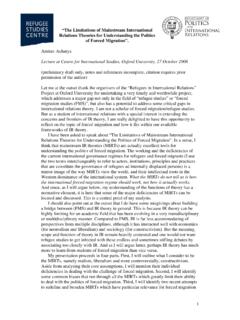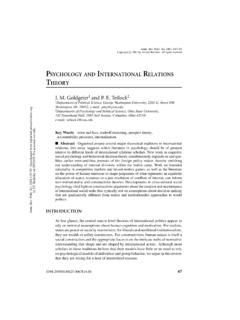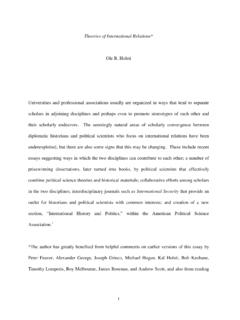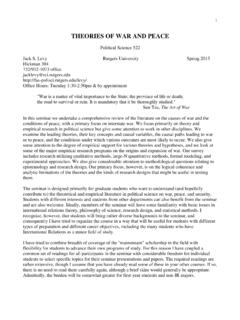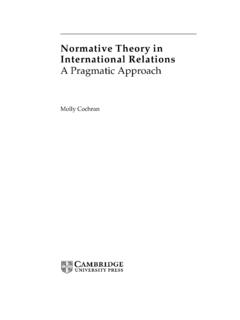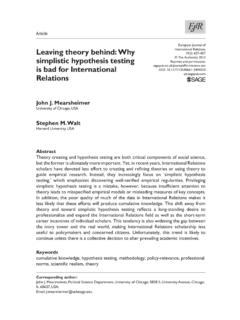Transcription of DOMESTIC POLITICS, FOREIGN POLICY, AND …
1 Annu. Rev. Polit. Sci. 1998. 1:289 313 Copyright 1998 by Annual Reviews. All rights reservedDOMESTIC politics , FOREIGNPOLICY, AND theories OFINTERNATIONAL RELATIONSJ ames D. FearonDepartment of Political Science, University of Chicago, Chicago, Illinois 60637;e-mail: WORDS: neorealism, structural realism, unitary-actor assumption, principal-agent theoryABSTRACTA significant and growing literature on international relations (IR) arguesthat DOMESTIC politics is typically an important part of the explanation forstates FOREIGN policies, and seeks to understand its influence more argue that what constitutes a DOMESTIC -political explanation of a state sforeign policy choices has not been clearly elaborated.
2 What counts as adomestic-political explanation is defined by opposition to systemic or struc-tural explanations. But these may be specified in several different ways Ispell out two each of which implies a different concept of DOMESTIC -political explanations. If a systemic IR theory pictures states as unitary, ra-tional actors, then a DOMESTIC -political explanation is one in which DOMESTIC -political interactions in at least one state yield a suboptimal FOREIGN policyrelative to some normative standard. Or, if a systemic IR theory picturesstates as unitary, rational actors and also requires that attributes of particularstates not enter the explanation, then a DOMESTIC -political explanation is anyone that involves state characteristics other than relative power.
3 Implicationsof each approach are developed, and examples from the literature are pro-vided. I also address the question of whether there is a sharp distinction be-tween a systemic theory of international politics and a theory of foreignpolicy, arguing that there is an important and natural sense in which they arethe significant amount of recent research in the international relations (IR) fieldadvances the proposition that DOMESTIC politics is typically a crucial part of the1094-2939/98/0616-0289$ for states FOREIGN policies. A crude measure of the prevalence ofsuch claims, arguments, and evidence is the proportion ofInternational Organi-zationarticle abstracts that more or less explicitly invoke DOMESTIC politics ordomestic-political factors in explanations for FOREIGN policy choices.
4 For theyears 1987 1996, slightly more than a third of the 193 abstracts I was able tocode invoked DOMESTIC -political factors as independent or intervening vari-ables. Given that a significant number of articles were not about explaining for-eign POLICY, 1this percentage is all the more impressive. Many books on inter-national relations published in recent years have also argued the case for the im-portance of DOMESTIC politics . Some of the noteworthy examples are Bueno deMesquita & Lalman (1992) on interstate war; Huth (1996) on territorial dis-putes; Peterson (1996) on crisis bargaining; Milner (1997), O Halloran (1994),and Verdier (1994) on trade policy ; Downs & Rocke (1995) on complianceand international cooperation; Evans et al (1993) on two-level games ; Russett(1993) on democracy and war; Snyder (1991) on great power expansionism;Stamm (1996) on war outcomes; Kier (1997) and Legro (1995) on militarydoctrine.
5 And the contributors to Rosecrance & Stein (1993) on grand of comparative politics sometimes wonder what would explainforeign policy if not DOMESTIC politics . One might reasonably ask what kind ofpolitics there is besides DOMESTIC politics . FOREIGN politics ? But isn t thatjust the DOMESTIC politics of FOREIGN countries, or the product of their domesticpolitics?Students of IR theory will recognize this as the central reductionist argu-ment that Waltz attacks in hisTheory of international politics (1979). The per-ceived novelty and interest of recent claims that DOMESTIC politics matters canbe understood only against the backdrop of Waltzian structural (or neo-) real-ism.
6 Rightly or wrongly, the recent literature interprets neorealism to hold thatdomestic politics is not very important or not necessary to explain significantforeign policy decisions or, at least, international political outcomes. Many ofthe articles in this new literature are essentially case studies plus the argumentthat a particular FOREIGN policy choice or international outcome can be ex-plained only by invoking some facet of a state s DOMESTIC politics . Other workin this literature essentially takes this as given, and asks the more interestingquestion, How does DOMESTIC politics matter?
7 (This objective is particularlysharply formulated in the two-level games literature initiated by Putnam1988.)Rather than reviewing the findings of this large literature, this article fo-cuses on an important and conceptually prior problem that has been insuffi-290 FEARON11In addition to various purely theoretical and conceptual papers, this set included numerousarticles pursuing second-image reversed arguments (Gourevitch 1978) where the dependentvariables are DOMESTIC political or economic addressed,2namely: What exactly is a DOMESTIC -political explanationof FOREIGN policy ?
8 What things have to be present for us to call an explanationof some FOREIGN policy choice a DOMESTIC -political explanation? This questionturns out to be surprisingly tricky, but it deserves an answer. Consider the twolinked research questions that animate much of this literature. First, how im-portant is DOMESTIC politics , relative to systemic or structural factors, in the ex-planation of states FOREIGN policies? And second, how, exactly, does domesticpolitics shape FOREIGN policy ? Neither question can be answered if we don tknow what a DOMESTIC -political explanation main argument of this essay may be summarized as follows.
9 Whatcounts as a DOMESTIC -political explanation of FOREIGN policy depends on an im-plicit contrast to explanations that are not DOMESTIC -political. The field callsthese systemic or sometimes structural explanations. But there are anumber of different ways to define a systemic IR theory, model, or argument(in this essay I use the three terms interchangeably). This implies that what wecount as a DOMESTIC -political theory can vary depending on the way we con-ceive of systemic , an important initial task is to spell out the different possible senses ofwhat a systemic IR theory is, the better to say what it means for DOMESTIC poli-tics to matter.
10 Although many types of arguments are described as systemic inthe literature, here I distinguish between two broad classes. In the first sense(which I will call S1), a systemic IR theory is one that envisions states as uni-tary and purposive actors that consider what other states will or might do whenthey choose FOREIGN policies. The second sense (labeled S2) is the same as thefirst, except that it adds conditions on which explanatory variables can operateor how they operate in a properly systemic theory. In particular, for Waltz anIR theory ceases to be systemic when characteristics of particular states arerelevant to the explanation offered, as opposed to properties of the system likethe distribution of (relative) two notions of what counts as a systemic IR theory imply in turn twodistinct notions (which I label D1 and D2) of what counts as a DOMESTIC -political explanation of FOREIGN policy .


